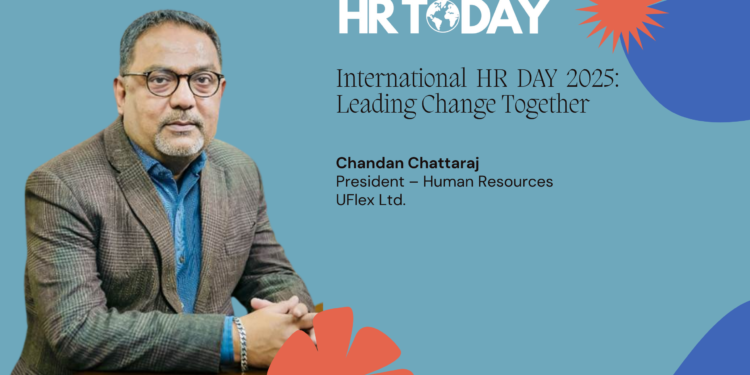As AI, automation, and hybrid work reshape the world of work, HR stands poised to lead this transformation. In this insightful HR Day message, Chandan Chattaraj, President – HR at UFlex Ltd., outlines how HR professionals must evolve as ethical leaders, change agents, and strategic architects of the new workforce.
Q1. How do you see Role of HR Evolving in next five to ten years?
Ans. Due to the technological evolution, demographic changes in workforce and organization’s priorities of HR will evolve dramatically in the next 5 -10 years.
There will be increased focus on Employee Experience (EX), mental well-being and work-life balance. Data-driven decision making will help in tailored benefits, career paths and engagement strategies.
AI and automation are poised to take on a significantly larger role in daily operational tasks. AI-powered hiring (chatbots, resume screening, predictive hiring) able to streamline recruiting practices.
HR analytics will play a big role in making qualitative decision-making in-terms of workforce planning, performance and development. HR will use predictive modelling to forecast attrition, productivity trends and talent gaps. Real-time analytics will help in proactive employee retention strategies.
HR leaders will play a key role in driving change management (e.g., digital transformation, restructuring). Chatbots & virtual assistants will handle routine HR queries, freeing up HR professionals for strategic roles.
Traditional degree requirements will decline in favour of skills-based hiring. HR will drive continuous learning & reskilling to adapt to automation and AI disruptions. Internal talent marketplaces will help employees transition into new roles within the organization.
HR will embed DE&I into all talent processes, from hiring to retiring. Data will track progress on diversity metrics and ensure fair compensation & opportunities. Focus will be on neurodiversity, accessibility, and cultural inclusion.
In Gig economy, Organizations must have to include temporary workers, freelancers, and contractors in their talent ecosystem. As a result, HR must come up with new ways to manage a hybrid workforce model that strikes a balance between organizational cohesiveness and flexibility. Policies around gig worker benefits, compliance, and engagement will become critical.
HR will need to ensure AI tools are unbiased and transparent in hiring, promotions, and performance reviews. Compliance with AI ethics regulations will be essential.
Employees (especially Gen Z & Millennials) expect companies to take a stand on social and environmental issues. HR will lead sustainability initiatives, ethical labor practices, and community engagement.
AI and machine learning will enable personalized career coaching, L&D paths, and benefits packages. Employees will have more control over their work schedules, rewards, and career growth.
HR is set to transform into a more analytical, employee-focused, and strategically vital function, integrating AI with human skills to develop resilient and progressive workplaces. HR professionals will need to upskill in analytics, change management, and ethical leadership to stay relevant.
Q2. What are the most pressing Talent Challenge you forsee in next 5-10 years different sectors?
Ans. Talking about pressing talent challenges in different sectors, I can clearly foresee that in manufacturing sector skills gap in automation will be a major challenge. Industry will require workers with digital plus mechanical skills. Workforce who can handle IOT, Robotics, smart factories will be much required. Another vital issue will be Aging workforce in traditional manufacturing (e.g., welding, machining) for instance in Uflex though we’re well-positioned in India regarding workforce demographics, our international facilities grapple with the pressing challenge of an aging skilled labor force in critical production roles.
In Energy & Utilities sector, there will be challenge in transition to Renewable Energy. Shortage of green energy experts (solar, wind, hydrogen), Oil & gas workers will need reskilling for clean tech roles, High competition for engineers in EV and battery manufacturing industry.
Cross sector challenges will be to reskill workers whose jobs are at risk due to AI & Automation displacement, with enhanced hybrid Work culture challenge will be on keeping distributed teams motivated.
Bridging the generational expectation gap presents a new challenge: satisfying Millennials’ need for purpose while meeting Gen Z’s requirements for ultra-flexible arrangements and faster career growth cycles.”
In my view key to overcome these challenges lies in proactive upskilling/reskilling programs, Strategic partnerships with academia & tech firms, Data-driven workforce planning, Flexible & inclusive talent strategies.
3. Your Message to HR Professionals on the occasion of HR DAY?
Ans. On this special Day — I extend my deepest appreciation and admiration for the incredible work each one of us in this HR Profession do every single day.
In a world of rapid change, we are the bridge between business strategy and human potential. We don’t just hire employees—we shape careers and life of a person. As the world of work evolves, so does our role — from policy enforcers to strategic partners, from caretakers of compliance to architects of culture.
The past few years have tested resilience like never before, with pandemic, economic turbulence, and global conflicts reshaping our world. Yet, through empathy and innovation, we not only adapted—we advanced.Our resilience, adaptability, and unwavering commitment to people are what truly makes the difference.
Let’s strive to closely and strategically partner ourselves with business by spotting future leaders before competitors do, connect talent moves to revenue growth, create talent magnets not job posts, predict skill gaps before business slows, build teams that beat market standards.
We must honour this respectable profession of OURS for seeing potential where others see resumes, listening deeply when employees need support, leading change with courage and compassion, turning workplaces into communities where people belong.
The path ahead will demand more agility, more innovation and more heart — but if anyone can redefine the future of work, it’s HR.
Read Also : HR at the Heart of Transformation: Shaping Purpose-Driven, Future-Ready Workforces in the Energy Sector
From Support to Strategy: HR’s Decisive Shift Toward Leading the Future of Work
Trust, Technology, and the Human Touch: Shaping the Future of HR










